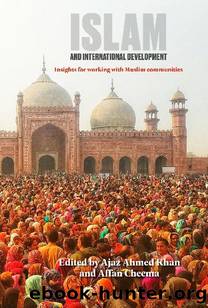Islam and International Development: Insights for working with Muslim communities by Ajaz Ahmed Khan

Author:Ajaz Ahmed Khan [Khan, Ajaz Ahmed]
Language: eng
Format: epub
Publisher: Practical Action Publishing Ltd.
Published: 2020-11-27T00:00:00+00:00
http://dx.doi.org/10.3362/9781788530613.006
CHAPTER 6
Gender and Islam
Shahin Ashraf and Najmo Abukar
Islam has a strong message on gender justice and the protection of the rights of women and children, stemming from the teachings in the Qur'an and ahadith. Despite this, women's and children's rights have continuously been violated as a result of misconstrued understandings of religion rooted in a culture of systematic patriarchy. This has resulted in the development of harmful traditional practices (HTPs) such as female genital mutilation and early forced marriage, which have resulted in the marginalization of women and children. Gender justice is a key aspect for progressive development and poverty eradication. There is limited understanding of gender justice and Islam. Faith-based organizations are uniquely positioned and well equipped to challenge HTPs and develop robust and modern frameworks that contest narratives that seek to use faith to reproduce patriarchal norms. Such a framework could play a vital role for the eradication of HTPs, the advancement of the economic empowerment of women, women's participation, and transformative leadership, as well as women's equal access to education. The framework would also be complementary to existing human rights laws as global initiatives on gender equality.
Keywords: Islam, gender justice, Maqasid objectives, climate justice, female genital mutilation (FGM), early forced marriage (EFM), human rights, Muslim, development
Introduction
Over the past decade there has been increasing interest in mainstreaming gender issues in development and humanitarian programmes. Faith-based organizations (FBOs) can play a valuable role in using faith perspectives and principles to challenge harmful social and cultural practices that continue to marginalize women and girls and deprive them of their human rights. Women and girls are disproportionately affected by structural inequalities, for example by having less control over assets and resources that increase their vulnerabilities during times of natural hazard and conflict (Bradshaw and Fordham, 2013), although their vulnerabilities may differ in terms of their age, race, disability, nationality, and sexual orientation. Gender justice aims to end the inequalities between men and women, particularly in relation to the distribution of power, resources, and knowledge.
The Islamic Declaration of Gender Justice seeks to contribute to this discourse by providing faith principles of justice and Maqasid al-Shari'ah objectives to underpin initiatives that challenge gender inequality (Islamic Relief, 2020). The following verse is one example of men and women being equal before God:
Indeed, the Muslim men and Muslim women, the believing men and believing women, the obedient men and obedient women, the truthful men and truthful women, the patient men and patient women, the humble men and humble women, the charitable men and charitable women, the fasting men and fasting womenâ¦for them Allah has prepared forgiveness and a great reward. (Qur'an, 33: 25)
There is a great need for FBOs and religious leaders to work in partnership and advocate for adalah (justice), equality, and fairness â principles that are already embedded in Islam. The Islamic perspective on development aims to create an environment that enables individuals to achieve full actualization of their spiritual, moral, and socio-economic well-being. In practice, using a faith-inspired approach to achieve Goal
Download
This site does not store any files on its server. We only index and link to content provided by other sites. Please contact the content providers to delete copyright contents if any and email us, we'll remove relevant links or contents immediately.
| Hadith | History |
| Law | Mecca |
| Muhammed | Quran |
| Rituals & Practice | Shi'ism |
| Sufism | Sunnism |
| Theology | Women in Islam |
The History of Jihad: From Muhammad to ISIS by Spencer Robert(2620)
Nine Parts of Desire by Geraldine Brooks(2360)
The Turkish Psychedelic Explosion by Daniel Spicer(2354)
The First Muslim The Story of Muhammad by Lesley Hazleton(2267)
The Essential Rumi by Coleman Barks(2043)
1453 by Roger Crowley(2022)
The Last Mughal by William Dalrymple(1855)
Trickster Travels: A Sixteenth-Century Muslim Between Worlds by Davis Natalie Zemon(1847)
Muhammad: His Life Based on the Earliest Sources by Martin Lings(1644)
God by Aslan Reza(1639)
by Christianity & Islam(1627)
A Concise History of Sunnis and Shi'is by John McHugo(1567)
No God But God by Reza Aslan(1540)
Magic and Divination in Early Islam by Emilie Savage-Smith;(1533)
The Flight of the Intellectuals by Berman Paul(1501)
Nothing to Envy by Barbara Demick(1445)
Art of Betrayal by Gordon Corera(1429)
What the Qur'an Meant by Garry Wills(1391)
Getting Jesus Right: How Muslims Get Jesus and Islam Wrong by James A Beverley & Craig A Evans(1340)
